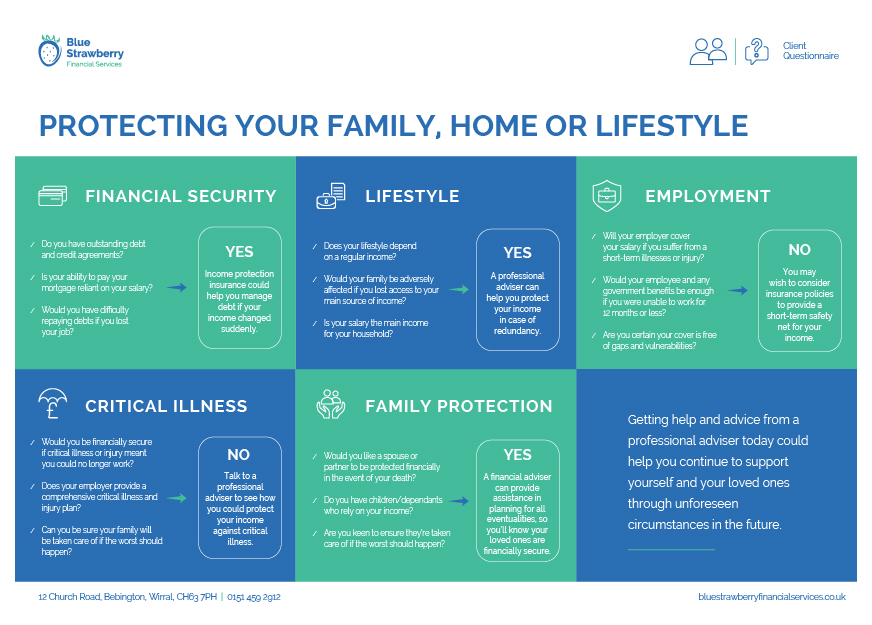LIFE ASSURANCE
We will not charge you a fee for our services relating to insurance, but we will receive commission from the produce provider. The commission will be calculated as a proportion of the premiums paid for the insurance product. You will receive a quotation which will tell you about the fees and charges relating to any insurance policy that we recommend.

Life assurance differs from life insurance because it covers you for your whole life, not just a fixed term. This means that the insurer will pay out no matter what age the policyholder is when they pass away, as long as they have paid their monthly premiums.
Life assurance tends to be more expensive than life insurance because the payout is guaranteed. And as you age, the amount you pay each month gets assessed every so often and has the potential to increase at certain times. Premiums tend to be invested by the insurer, and the success of these investments can affect the amount of the payout upon death. The payout is generally tax-free, but you need to discuss this with an expert to ensure this benefit.
Key Questions Answered
Here are some answers to the more common questions we get asked. If you would like to know how these factors might affect you specifically, book a initial consultation with one of our award winning team.
What is life assurance, and how does it work?
How much life assurance coverage do I need?
What’s the difference between life assurance and life insurance?
Can I get life assurance if I have pre-existing medical conditions?
How are life assurance premiums calculated?
CRITICAL ILLNESS
We will not charge you a fee for our services relating to insurance, but we will receive commission from the produce provider. The commission will be calculated as a proportion of the premiums paid for the insurance product. You will receive a quotation which will tell you about the fees and charges relating to any insurance policy that we recommend.

Critical illness cover is a type of insurance that offers the policyholder a tax-free payout if they are diagnosed with an insured medical condition during the term of the policy. The illnesses covered will be pre-agreed when the policy is created, with the most comprehensive cover protecting the policyholder for around 40-50 conditions.
This type of protection is a significant financial help if you become ill and can no longer work. It can be added as an extra to your life insurance cover if the life insurance policy does not have it as standard. Taking critical illness cover as well as life insurance means you have a choice between additional cover and combined cover.
Additional cover is where you get a payout both upon hearing the news of the illness and when you die. Combined cover means you simply get one payout either when you become ill or when you pass away.
Key Questions Answered
Here are some answers to the more common questions we get asked. If you would like to know how these factors might affect you specifically, book a initial consultation with one of our award winning team.
What is critical illness cover, and how does it work?
What illnesses are typically covered by critical illness insurance?
How much critical illness cover do I need?
Can I get critical illness cover with pre-existing health conditions?
Is critical illness cover the same as life insurance?
INCOME PROTECTION
We will not charge you a fee for our services relating to insurance, but we will receive commission from the produce provider. The commission will be calculated as a proportion of the premiums paid for the insurance product. You will receive a quotation which will tell you about the fees and charges relating to any insurance policy that we recommend.

Income protection insurance is where the policyholder is covered if they can no longer work due to accident, sickness and/or unemployment. There are two types of cover – short-term and long-term.
Short-term policies will cover your essential outgoings, such as debt or mortgage repayments, for a short period to prevent you from defaulting while you are ill. This type of policy may also be used to maintain your lifestyle if you lose income.
Long-term policies will pay a regular amount to the policyholder until they either become well again and return to work, retire or until the policy ends.
Key Questions Answered
Here are some answers to the more common questions we get asked. If you would like to know how these factors might affect you specifically, book a initial consultation with one of our award winning team.
What is income protection, and how does it work?
How much of my income can I protect with income protection insurance?
How long will my income protection policy pay out?
Can I get income protection if I have a pre-existing medical condition?
When does the income protection policy start paying out?
BUILDINGS & CONTENT COVER
We will not charge you a fee for our services relating to insurance, but we will receive commission from the produce provider. The commission will be calculated as a proportion of the premiums paid for the insurance product. You will receive a quotation which will tell you about the fees and charges relating to any insurance policy that we recommend.

This is basically home insurance. It is a combined insurance and is designed to cover or replace any property that may be damaged or stolen inside the home. It will also cover any damage that may happen to the house itself, be it fire or flood, depending on the insurance cover you get.
If you have a mortgage, you will need this type of insurance, and in fact, some mortgage providers enforce this as compulsory insurance as part of the mortgage agreement. If you wanted, you could get the two covers separately but combined is usually superior. It is not a particularly expensive insurance, and the peace of mind it offers you is second to none. For this reason, pretty much every home is insured with this type of cover.
Key Questions Answered
Here are some answers to the more common questions we get asked. If you would like to know how these factors might affect you specifically, book a initial consultation with one of our award winning team.
What is the difference between buildings and contents insurance?
Do I need both buildings and contents insurance?
What does buildings insurance typically cover?
What items are covered under contents insurance?
How much coverage do I need for buildings and contents insurance?
FAMILY LIFE INSURANCE
We will not charge you a fee for our services relating to insurance, but we will receive commission from the produce provider. The commission will be calculated as a proportion of the premiums paid for the insurance product. You will receive a quotation which will tell you about the fees and charges relating to any insurance policy that we recommend.

This is a type of life insurance that covers the policyholder’s family in the event of their death. But it also covers their children too, up to a certain age. Family life insurance is not actually an individual policy, instead it offers financial security to the policyholder’s family under the guise of life insurance. It can cover simple things like mortgage repayments and debts.
There is a level term policy where your family will receive a fixed amount no matter when you pass away during the term of the policy. There’s also mortgage life insurance which incorporates your debts, including the mortgage. With this policy, the amount your family receives will reduce over time.
This is the cheapest option for a family life insurance policy. There is also the option of joint life insurance for you and your partner.
Key Questions Answered
Here are some answers to the more common questions we get asked. If you would like to know how these factors might affect you specifically, book a initial consultation with one of our award winning team.
What is the difference between family income benefit and life insurance?
How much life insurance cover do I need for my family?
Can I combine life insurance with family income benefit?
What happens if I stop paying my life insurance premiums?
How are life insurance premiums calculated?
BUSINESS PROECTION
We will not charge you a fee for our services relating to insurance, but we will receive commission from the produce provider. The commission will be calculated as a proportion of the premiums paid for the insurance product. You will receive a quotation which will tell you about the fees and charges relating to any insurance policy that we recommend.

Business protection insurance is a type of insurance designed for anyone who runs their own company. Without it, you may actually be breaking the law. This type of insurance covers the policyholder’s business against any form of financial loss, such as theft, and any form of damage to tools and equipment. It will also cover lawsuits and legal expenses as well as personal injury claims against the business.
A combined insurance policy will cover public liability, professional indemnity, and employer liability. It is a godsend to businesses as it provides reassurance and helps when the business needs it the most. This means that uncertainty is reduced, allowing the business to continue as per usual. The type of insurance you will need depends upon the type and size of the business you have.
Business protection services are referred to a third party. Neither Blue Strawberry Financial Services Ltd nor PRIMIS are responsible for the service received
Key Questions Answered
Here are some answers to the more common questions we get asked. If you would like to know how these factors might affect you specifically, book a initial consultation with one of our award winning team.
What is business protection insurance, and why do I need it?
What types of business protection policies are available?
How is key person insurance different from life insurance?
How do I decide the level of cover needed for my business?
Can a small business benefit from business protection insurance?
AWARD WINNING CUSTOMER SERVICE




Useful Resources
We understand the daunting nature of navigating the property market for the first time. That’s why we’ve created this section to offer a range of informative articles and free downloadable guides designed to arm you with the knowledge and confidence needed to make informed decisions throughout the process.











